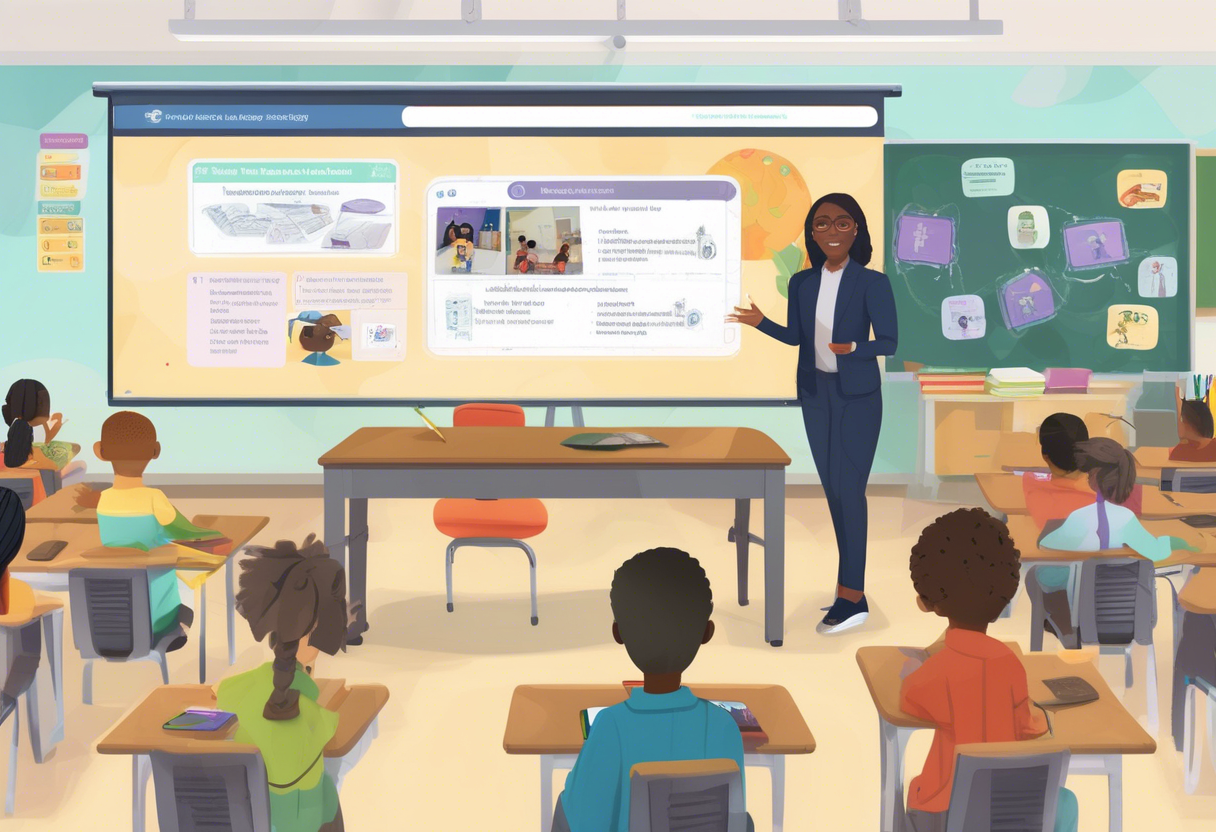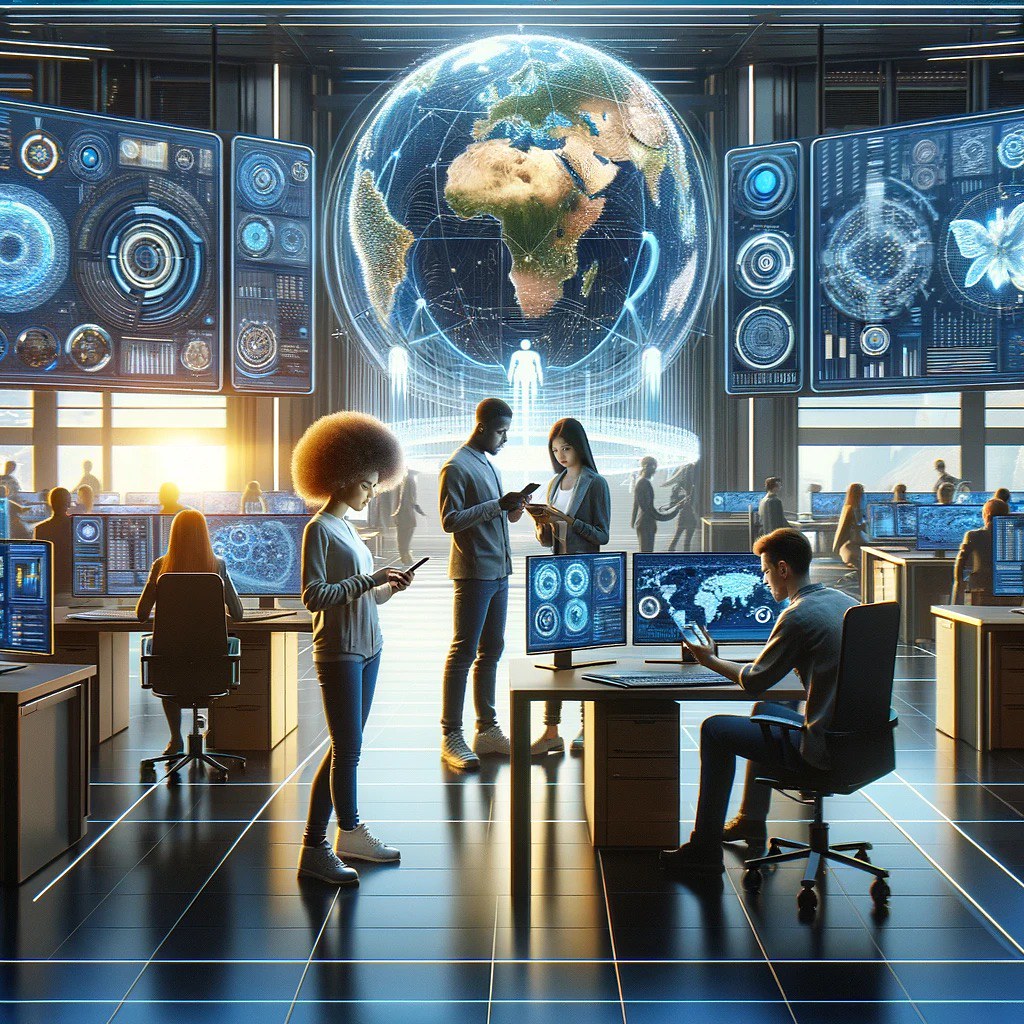
Imagine a classroom where each student's learning journey is as carefully crafted as a custom-made suit, fitting just right. This isn't some sci-fi fantasy; it's happening now with AI in personalized learning. We're at the edge of big changes in education, with AI reshaping how we create learning experiences that are both engaging and effective. A recent study shows that 86% of educators think AI can boost personalized learning, offering new ways to meet different learning styles and speeds. In this article, we'll look at how AI is more than just a tool—it's a powerful force in education, helping teachers bring out the best in every student. Let's explore the world of AI-driven personalized learning, where technology and human potential come together beautifully.
Summary: Este artículo describe cómo la inteligencia artificial está transformando la personalización de las experiencias de aprendizaje y mejorando la efectividad educativa. Se exploran las aplicaciones actuales y futuras de la IA en el ámbito educativo.
AI's Impact on Tailoring Learning Experiences
Understanding AI in Personalized Learning
Definition and Concept of AI in Personalized Learning
AI in personalized learning leverages technology to customize education based on each learner's unique needs, strengths, and weaknesses. It employs AI algorithms to analyze student data, identifying patterns and preferences to craft personalized learning paths. This concept is rooted in adaptive learning, where technology adjusts educational materials based on student performance and feedback. For instance, if a student struggles with a topic, an AI system can modify the content's difficulty in real-time to enhance learning. Thus, AI ensures that each student receives the most suitable and effective content, boosting both engagement and understanding.
Historical Context and Evolution of AI in Education
Personalized learning is not a new concept. It traces back to Piaget's theories, which emphasize individual learning stages. However, AI's role in this domain has significantly evolved. Early educational technology was quite basic, often following a one-size-fits-all approach. Now, with advancements in AI, personalized learning has become more dynamic, offering real-time feedback and data insights. Schools and organizations are increasingly recognizing this shift, with 62% of education leaders acknowledging AI's substantial impact on personalized learning. This transition is steering us away from traditional teaching methods towards AI-driven platforms that tailor content based on students' real needs.
Benefits of AI-Driven Personalized Learning
Boosting Student Engagement and Motivation with AI
AI-driven personalized learning enhances student engagement by 45% by tailoring content to individual needs and preferences. When AI customizes learning materials, it increases students' interest and motivation. It even incorporates virtual and augmented reality to create engaging, interactive environments. Imagine an AI platform using games and instant feedback to keep students excited and engaged.

Enhancements in Academic Performance through AI Tools
Students utilizing AI tools experience a 30% improvement in academic performance compared to traditional methods. These systems provide prompt, personalized feedback, aiding students in grasping difficult concepts and improving grades. AI analytics also enable teachers to intervene early, supporting student success. For example, an AI tool might identify a student's struggles in math and offer targeted exercises, leading to better grades.
Inclusivity and Accessibility in AI-Powered Learning
AI in personalized learning addresses learning gaps by tailoring instruction to diverse needs, promoting inclusivity. It adapts to different learning styles and speeds, making education accessible to students with disabilities or varied abilities. By providing customized resources, AI bridges gaps for learners who might be overlooked in traditional settings. For instance, it can adjust content for students with visual or learning disabilities, ensuring everyone has a fair opportunity to learn.
AI Technologies and Tools in Personalized Learning
Adaptive Learning Platforms Powered by AI
These platforms utilize AI to continuously evaluate student performance, adjusting content difficulty in real-time. They offer personalized assistance and instant feedback, enhancing understanding and learning efficiency. AI-powered systems close learning gaps and improve outcomes by tailoring instruction. A math app, for example, might alter problem sets based on a student's mastery and speed.
Augmented Reality (AR) and Virtual Reality (VR) Integrated with AI
AI combined with AR and VR creates immersive learning experiences that transcend traditional methods. These tools provide interactive simulations and virtual environments tailored to learning goals and styles. AI-driven AR/VR supports experiential learning, enhancing motivation and comprehension of complex subjects. Consider a VR biology lab where students explore cells interactively, adapting based on their prior knowledge.

AI Feedback and Assessment Systems
AI feedback systems deliver immediate, personalized responses to student work, facilitating quick learning and error correction. Analytics tools offer insights into student progress, enabling educators to identify areas needing support. These systems permit early interventions, improving educational outcomes. An AI grading system, for instance, might instantly evaluate essays and provide feedback for revisions.
Ethical Considerations and Challenges
Data Privacy and Security in AI-Driven Learning
AI in personalized learning raises significant concerns about student data privacy and security. Robust data protection and ethical handling of sensitive information are essential to maintain trust and comply with legal requirements. Balancing data-driven personalization with privacy safeguards is challenging. Implementing encryption and strict access controls for AI platforms handling student data can help address these issues.
Equity and Over-Reliance on AI in Education
Excessive reliance on AI could exacerbate educational disparities if access is unequal. AI should complement, not replace, teachers to ensure balanced learning. Thoughtful policies and strategies are necessary to avoid biases in AI and ensure fair treatment for all students. Ensuring AI tools are accessible to underserved communities and serve as teacher support, not substitutes, is crucial.
Future Trends and Innovations in AI for Education
Emerging AI Technologies in Personalized Learning
New AI innovations, such as advanced language processing and predictive analytics, are enhancing personalized learning. Integrating AI with AR/VR and wearables creates more immersive educational experiences. Research focuses on improving AI's ability to understand emotional and cognitive states for better learning. Imagine AI systems adapting not only to performance but also to student stress and engagement levels.
Policy Recommendations and Implementation Strategies for AI in Education
For AI to be effective in education, clear policies on data privacy, access, and teacher training are necessary. Strategies should emphasize AI as a tool to support, not replace, teaching. Continuous evaluation and stakeholder input are vital for ethical and effective AI-driven learning. Establishing guidelines for AI use in schools that ensure transparency, fairness, and ongoing teacher development is a step in the right direction.
FAQs on AI in Personalized Learning
How does AI improve student engagement and motivation?
AI enhances engagement and motivation by tailoring learning to individual interests and styles. By providing personalized content and instant feedback, AI makes learning more interactive and relevant. Gamification features like badges and leaderboards can also be included to reward progress and encourage a competitive spirit, further enhancing motivation.
What are the main challenges of integrating AI in educational settings?
Challenges include data privacy and security, ensuring equitable access to AI, and avoiding over-reliance that might undermine educators. Addressing these requires strong data protection, thoughtful implementation, and a balanced approach that values both technology and human contributions to education.
How does AI-driven personalized learning impact student performance?
AI-driven learning positively impacts performance by identifying knowledge gaps and providing targeted resources. This ensures students receive the support they need to master challenging concepts, reducing the likelihood of falling behind. AI analytics can also predict challenges and offer proactive help, aiding students in achieving their academic goals.
For more on AI in personalized learning, check out the Psico Smart Blog or the International Transactions on Education Technology.